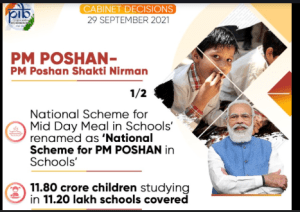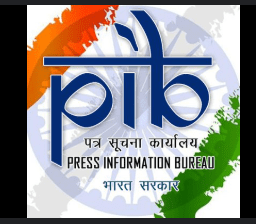New Delhi :In a major policy step aimed at strengthening nutritional security and addressing inflationary pressures, the Ministry of Education has officially approved a 9.5% increase in the ‘Material Cost’ component of the centrally sponsored Pradhan Mantri Poshan Shakti Nirman (PM POSHAN) scheme. The enhanced rates will be implemented nationwide starting May 1, 2025, and are projected to positively impact over 11.20 crore schoolchildren studying in 10.36 lakh Government and Government-aided schools, including Balvatika, Primary, and Upper Primary levels. This move reflects the government’s continued commitment to ensuring access to hot, cooked meals for children from economically disadvantaged backgrounds, thereby improving both educational participation and health outcomes.
PM POSHAN: A Cornerstone for Nutritional Support and Educational Equity
The Pradhan Mantri Poshan Shakti Nirman (PM POSHAN) scheme, earlier known as the Mid-Day Meal Scheme, is one of India’s largest social welfare programs aimed at addressing classroom hunger and malnutrition. Launched with the objective of ensuring that every child receives at least one balanced, hot cooked meal during school hours, the scheme currently benefits over 11.20 crore children across 10.36 lakh Government and Government-aided schools. It includes children from Balvatika (pre-primary) to Class VIII, covering both rural and urban areas.
 The nutritional standards under PM POSHAN are meticulously designed: children in the primary section receive meals with a minimum of 450 calories and 12 grams of protein, while those in the upper primary are provided with 700 calories and 20 grams of protein per meal. These meals include essential components like pulses, vegetables, oil, and spices, customized as per local taste and availability, thereby also promoting local agriculture and employment through decentralized procurement.
The nutritional standards under PM POSHAN are meticulously designed: children in the primary section receive meals with a minimum of 450 calories and 12 grams of protein, while those in the upper primary are provided with 700 calories and 20 grams of protein per meal. These meals include essential components like pulses, vegetables, oil, and spices, customized as per local taste and availability, thereby also promoting local agriculture and employment through decentralized procurement.
Beyond nutrition, the scheme also aims to enhance school participation, particularly among girls, children from Scheduled Castes (SCs), Scheduled Tribes (STs), and economically weaker sections. Studies have shown that the availability of mid-day meals has positively influenced school enrollment, attendance, and learning outcomes, while also easing the burden on families struggling with food insecurity.
The PM POSHAN scheme plays a dual role in nation-building: ensuring children’s right to food and education while contributing to social equity and public health. The program also serves as a crucial employment generator for over 25 lakh cooks and helpers, many of whom are women, thus supporting gender empowerment and rural livelihoods.
📈 Inflation-Linked Enhancement: Why the Hike?
In response to rising food prices and cost-of-living adjustments, the Ministry of Education has approved a 9.5% increase in the ‘Material Cost’ under the PM POSHAN Scheme, ensuring that the nutritional quality of meals served in schools does not deteriorate due to inflationary pressures. This adjustment is anchored in the Consumer Price Index for Rural Labourers (CPI-RL), a reliable metric developed by the Labour Bureau under the Ministry of Labour.
The CPI-RL is derived from monthly price data collected from 600 villages across 20 Indian states, reflecting changes in the cost of essential commodities like pulses, vegetables, edible oil, spices, and fuel. This ensures that the revised material cost remains in tune with real market trends, helping to maintain both the quantity and quality of the meals served to schoolchildren.
The updated per student, per day material cost will be applicable from May 1, 2025, and the revised rates are as follows:
| Class Group | Previous Rate (₹) | New Rate (₹) | Increase (₹) |
|---|---|---|---|
| Bal Vatika | 6.19 | 6.78 | 0.59 |
| Primary (Class I–V) | 6.19 | 6.78 | 0.59 |
| Upper Primary (Class VI–VIII) | 9.29 | 10.17 | 0.88 |
This enhancement comes at a significant cost to the exchequer. The Central Government will absorb the full financial impact, which is estimated to be around ₹954 crore in FY 2025–26. Despite this additional expenditure, the move has been widely welcomed by nutritionists and education experts as a timely and necessary intervention to preserve the program’s effectiveness in light of rising food inflation.
🧂 What Goes into a PM POSHAN Meal?
Under the PM POSHAN Scheme, ‘Material Cost’ refers to the expenditure incurred on procuring core cooking ingredients that form the basis of a nutritious school meal. These include pulses, vegetables, cooking oil, spices, condiments, and fuel, carefully portioned to meet the age-specific dietary needs of children.
The standard ingredient allocation per student per meal is as follows:
-
Pulses: 20 grams (Balvatika/Primary), 30 grams (Upper Primary)
-
Vegetables: 50 grams (Balvatika/Primary), 75 grams (Upper Primary)
-
Oil: 5 grams (Balvatika/Primary), 7.5 grams (Upper Primary)
-
Spices & Fuel: As per requirement
This base allocation ensures children receive a protein- and fiber-rich diet that supports their physical and cognitive development. In addition, States and Union Territories are empowered to enhance these meals by contributing beyond the minimum prescribed cost from their own resources.
Several states have already taken proactive steps to do so, introducing local staples, fortified foods, and even milk or fruit to the menu — transforming the PM POSHAN meal into a more comprehensive nutritional aid. These customizations not only enrich the diet but also foster a connection with regional culinary diversity, making meals more relatable and appealing for students.
🚛 Food Grains & Logistics: A Fully Funded Effort
While the ‘Material Cost’ ensures the procurement of key ingredients, the backbone of the PM POSHAN Scheme lies in its robust foodgrain and logistics infrastructure—a cost-intensive component that is entirely funded by the Central Government.
Every year, approximately 26 lakh metric tonnes of foodgrains are allocated for the scheme through the Food Corporation of India (FCI). These foodgrains serve as the staple base for the hot cooked meals provided daily to students from Balvatika to Class VIII. Importantly, the Government of India bears 100% of the cost of these foodgrains, which amounts to around ₹9,000 crore annually.
In addition to the procurement cost, the Centre also fully funds the transportation charges—ensuring seamless delivery from FCI depots to individual schools across states and union territories. This commitment eliminates financial strain on states for this critical aspect of the scheme, ensuring equity and uninterrupted meal provision nationwide.
When all components—ingredients, foodgrains, fuel, labor, and logistics—are factored in, the total cost per student per meal is calculated as:
-
₹12.13 for students in Balvatika and Primary classes (I–V)
-
₹17.62 for students in Upper Primary classes (VI–VIII)
This level of comprehensive support not only safeguards food security but also affirms the government’s dedication to holistic child welfare through nutrition, education, and social equity.
A National Commitment to Child Welfare
The recent enhancement of material cost under the PM POSHAN Scheme is more than just a fiscal adjustment—it is a clear reaffirmation of the Government of India’s long-standing commitment to the health, education, and holistic development of the country’s children. With over 11.20 crore students benefiting daily, the scheme plays a pivotal role in bridging nutritional gaps, especially among children from economically disadvantaged and marginalized communities.


Furthermore, this scheme fosters gender equity and social inclusion by creating jobs for thousands of women as cooks and helpers in schools, many of whom belong to self-help groups and underprivileged backgrounds. The inclusion of Balvatika (pre-primary) students under the scheme reflects a forward-looking approach, recognizing that nutrition in early childhood is critical for long-term development.
In times marked by inflation and socio-economic challenges, the government’s decision to absorb the additional ₹954 crore financial burden without shifting the cost to states or families signals an unwavering focus on child-centric policy-making. As India strides towards its educational and public health goals, the PM POSHAN Scheme continues to symbolize nutritional justice and inclusive progress, ensuring that no child is left behind in the pursuit of learning and well-being.
To learn more about the PM POSHAN Scheme, visit the official Ministry of Education portal.
For more Real time updates, visit Channel 6 Network.

